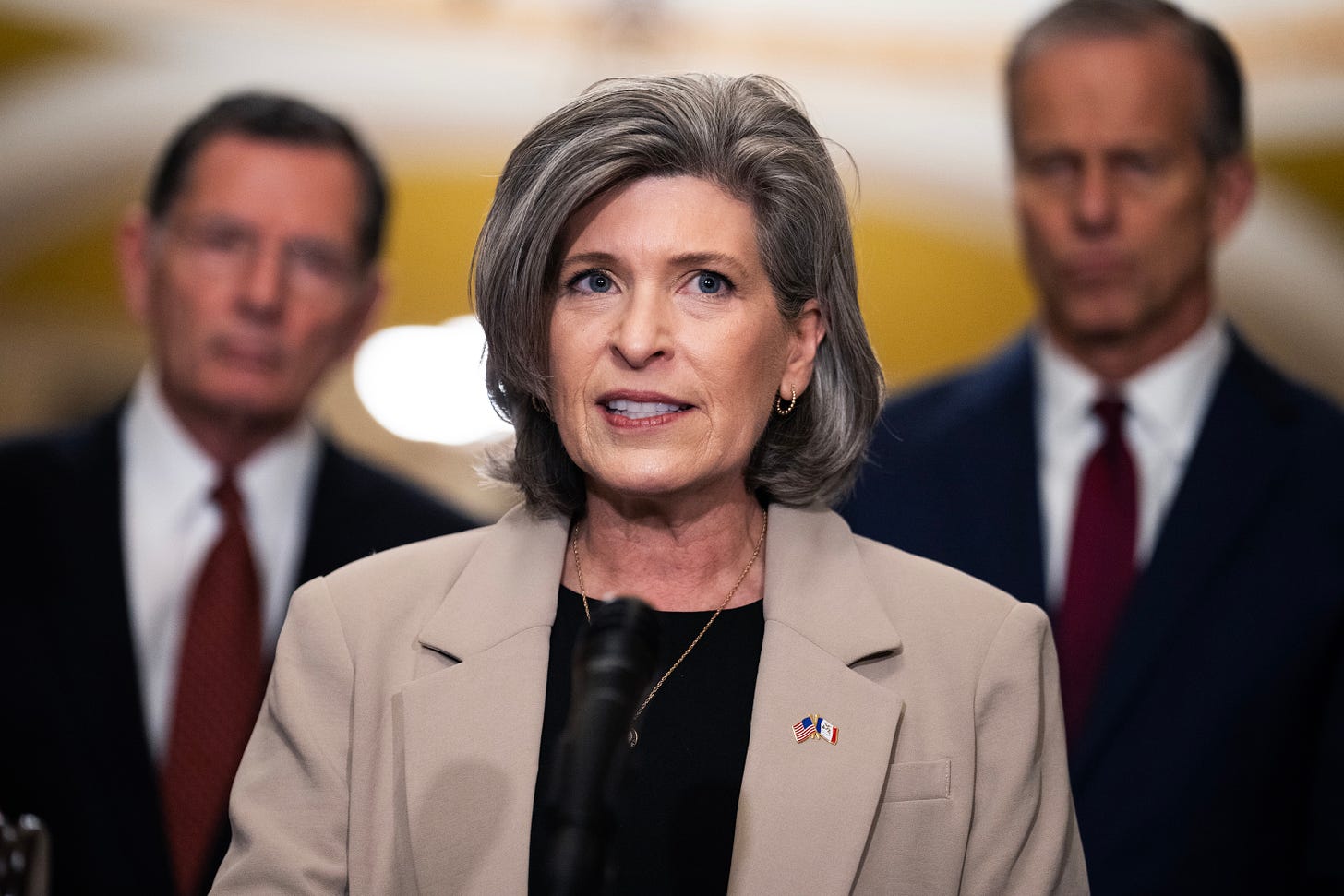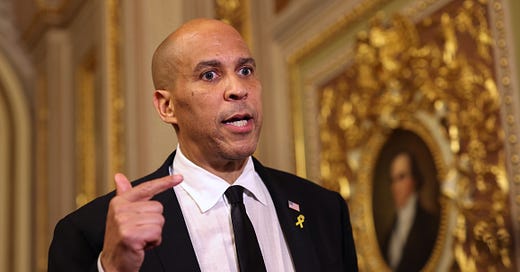
Senate Republicans Could Still Deny Trump His Worst Picks
Don’t give up hope—it’s too soon for anticipatory disappointment.

HOW MUCH IS IT FAIR TO EXPECT in the name of defending democracy?
When the fight escalates and spills over into real life, and real safety concerns, who among us has standing to judge?
You can wish desperately—as I did—that FBI Director Christopher Wray would have stuck it out, fought to the end, instead of announcing he would resign before Donald Trump took office.
The trouble is, in this case, fighting to the end could mean fighting to the death. Or living in fear of it.
This past July, John Woodbury of Roswell, Georgia, was arrested and charged in federal court with two felonies for threatening violence against Wray last year. Count one of the indictment cited threats by interstate communication:
[T]he defendant posted a message on 4chan.org that called for violence against Director Wray and others, which included, but was not limited to, posting Director Wray’s purported home address and stating the following: “Let’s show them what a fucking ‘Nazi’ . . . looks like. . . . It’s time to burn these mother fuckers down and hang them from trees. Hit them where it fucking hurts. Hit Chris at his home. Make his family fear stepping one foot outside their god damn door.”
Count two charged Woodbury with threats to a federal law enforcement officer, saying he knowingly threatened “to assault, kidnap, and murder” Wray.
One can only imagine being FBI director for the last seven years in a threat environment like this. What we know for sure is that Wray has a wife. He has two adult children. He has led the FBI during investigations of Trump and Russia, of Trump and Ukraine, of Trump and the January 6th riot. Of private-citizen Trump hoarding top secret classified documents at Mar-a-Lago (in violation of federal law), and the subsequent FBI search to recover them for the government. “He invaded my home. I’m suing the country over it. He invaded Mar-a-Lago,” Trump said of Wray this month on NBC’s Meet The Press.
The price of resistance
We learned early in Trump’s first term what he expects of his FBI directors. James Comey, fired in May 2017, described it indelibly in a prepared statement to Congress a month later: “I need loyalty, I expect loyalty,” Trump told him. Comey replied that the FBI was better off independent of presidents and instead promised honesty. Trump then gave that a twist, demanding “honest loyalty” and Comey agreed—not because the term meant anything definitive, he later recalled, but in order to end “a very awkward conversation.”
Comey’s kind of loyalty—to the country, the Constitution, and the law—wasn’t enough.
The loyalty tests are more explicit now, the second time around. If you want to work for Trump, you must be willing to go along with his lies about the 2020 election. And the penalties for disloyalty are more explicit this time around, too. Whatever serious qualms they may have about Trump’s prospective nominees, members of Congress are expected to say “yessir” and fall in line. If not, they’ll face primary opponents, at the least. And who knows what loose cannons in MAGA world will dream up.
Sen. Joni Ernst of Iowa is taking incoming right now from all sides over former Fox News host Pete Hegseth, Trump’s wildly inappropriate defense secretary pick. Hegseth has been accused of sexual assault and abusing women, and has in the past opposed women in the military, especially in combat, in sexist terms. That’s on top of many reports of a drinking problem, and forced exits from two nonprofits for alcohol abuse and financial mismanagement.
You’d expect Ernst—a sexual assault survivor and combat veteran—to have problems with Hegseth, and she did. But after two meetings, Ernst is now apparently “warming” to him while he has apparently warmed to the idea of women in the military and in combat. “I support Pete through this process,” Ernst has said, whatever that means.
The strategic ambiguity has inflamed Hegseth opponents counting on Ernst, a key to blocking his ascent, to be more definitive. And it’s not wrong to be wary of anticipatory obedience, in author Timothy Snyder’s phrase, by Wray or Ernst or any other public figure who could lead by example.
No reason to disobey in advance
At the same time, why would Ernst declare her intentions now, in the middle of holiday season and more than a month before confirmation season? She is the target of a MAGA pressure campaign that would only get worse if she disobeyed in advance. According to Puck, Trump loyalists have already threatened to “dig up dirt on her,” run ads against her, warned of a primary challenge, and accused her of waging an “aggressive personal jihad” against Hegseth.
Sen. Lisa Murkowski (R-Alaska), speaking at a No Labels conference last week, called Ernst “one of the more conservative, principled Republican leaders in the Senate right now” and slammed Republicans for going after her, Politico reported. Later, at the same event, Utah Sen-elect John Curtis said he had talked to a sitting senator who feels like “the entire world” is coming after her and her staff, because she “may or may not” vote for one of Trump’s Cabinet choices. “She has to worry about things like, ‘Well, if I vote against this nominee, what happens to my state when I need something from this administration?’” Curtis said.
The threats have been implied, he said, not overt. But Trump’s first term made clear this is exactly how he operates. And the higher the stakes, the more public his musings about punishing defiance, whether by blue-state governors or Republican critics; whether it’s cutting off wildfire aid to California, denying COVID aid to Michigan and Washington, or firing a couple of FBI directors.
Each day the damning information mounts about one Trump pick or another, with more reasons for various senators to vote against them. I cannot predict, for instance, whether Sen. Mitch McConnell—a polio victim as a toddler, before vaccines—will support anti-vax Robert F. Kennedy Jr. as the nation’s top heath leader, especially since we now know that RFK Jr.’s lawyer wants the government to withdraw approval for the polio vaccine, and McConnell has said that is dangerous for public health and potentially disqualifying for RFK Jr.’s nomination.
So I don’t think it’s fair to predict what McConnell will do next year, when he is no longer the GOP leader and is unlikely to run for re-election in 2026. It’s not fair to give up on any potential Republican resistance at this point—before Trump is president; before anyone has been officially nominated; before FBI background checks and continued revelatory reporting by journalists; before it is necessary to cast a series of fateful votes.
Most Senate Republicans will vote to confirm all of Trump’s personnel choices. But a fluid group of four GOP no votes, depending on the nominee and added to the Democratic opposition, could block those with the most potential to cause havoc or tragedy.
With that in mind, I’m not going to indulge in anticipatory disappointment. Even though I may be disappointed in the end.
















